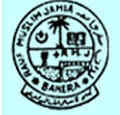Committee
IQAC
The IQAC will become a part of the institution’s system and work towards realization of the goals of quality enhancement and sustenance. The prime task of the IQAC is to develop a system for conscious, consistent and catalytic improvement in the overall performance of institutions. For this, during the post-accreditation period, it will channelize all efforts and measures of the institution towards promoting its holistic academic excellence.
The IQAC is entrusted with the responsibility of ensuring total quality management by ushering in innovations leading to achieving excellence and adoption of intervention strategies for monitoring their successful implementation. Ever in quest for excellence, the IQAC functions to assure institutional accountability with probity to all the stakeholders, funding agencies in particular and society as a whole.
Anti Ragging Committee
Anti-Ragging Committee to ensure compliance with the provisions of Regulations as well as the provisions of any law for the time being in force concerning ragging; and also, to monitor and oversee the performance of the Anti-Ragging Squad in prevention of ragging in the institution.
Ragging is a criminal offense. Ragging is strictly prohibited by both State Govt. and Central Govt. Punishment for ragging will be as follows:
- (i) Imprisonment up to three years and fine of Rs.50,000/-
- (ii) Dismissal from the college
Objectives:
- To prohibit, prevent and eliminate the scourge of ragging including any conduct by any student whether by words spoken or written or by an act which has the effect of teasing, treating or handling with rudeness a fresher or any other student, or indulging in rowdy or undisciplined activities by any student.
- To monitor, direct and oversee the functions and performance of the Anti-Ragging Squads in prevention and curbing of ragging in the institution
Grievance Redressal committee
Objectives
- To formulate the policy to investigate and review complaints or grievances of students and faculties.
- To create awareness of availability of members for students and faculties to report grievances.
- To investigate the cause of grievances.
- To ensure effectual solution depending upon the gravity of the
Definition: In these regulations, unless the context otherwise requires
- “Act” means the University Grants Commission Act, 1956 (3 of 1956);
- “aggrieved student” means a student who has any complaint in the matters concerned with the grievances defined under these regulations, and includes a person seeking admission to any institution of higher education;
- “college” means any institution, whether known as such or by any other name, which provides for a course of study for obtaining any qualification from a university and which, in accordance with the rules and regulations of such university, is recognised as competent to provide for such course of study and present students undergoing such course of study for the examination for the award of such qualification;
Minority Committee
The minority cell of the college is formed with the purpose of empowering the students of the minority communities studying in the college. The Minority Cell helps minority students including Christian, Muslim etc. The cell facilitates financial support to students from minority communities and also from government agencies. The cell also enhances equal opportunities for education of minorities, and encourages minority students to enroll for career orientation programmes like Soft skills training, Entrepreneurship training, and NET/ TET/ CTET coaching classes, to empower and equip them with the necessary skills to choose career options.

